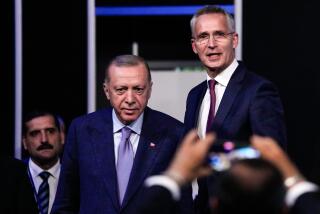Jim Baker Is Off to the Provinces : But Washington needs to heed allies like Turkey as it heads off Tehran’s Central Asia bid
- Share via
Turkmenistan. Tajikistan. Uzbekistan. Even a few months ago these remote provinces of the late Soviet empire would have been unlikely to draw the personal attention of the American secretary of state. This coming week, however, James A. Baker III plans to spend three days in these newly independent Central Asian countries, preparing the ground for granting them diplomatic recognition and gently advising their mainly Muslim populations that forging good relations with the West and with such moderate Islamic states as Egypt and Turkey is very much in their interests.
Motivating this trip most of all is concern about neighboring Iran’s efforts to gain a political foothold in Central Asia. “The collapse of the Soviet Union,” Baker told the Senate Foreign Relations Committee the other day, “has produced a once-in-a-century opportunity to advance American interests and values throughout the world.” But not, he might have added, without vigorous competition in some places. Iran has mounted a major campaign in Central Asia to spread its message first. Though Tehran has somewhat moderated its extremist brand of Islamic revolutionary fervor, its message remains implacably hostile to the West and the modernism it represents.
Tehran has been dispatching money, mullahs and trade missions to Central Asia in an attempt to cement its influence. It’s finding it easiest to communicate in Tajikistan, most of whose 5 million people speak an Iranian language; in much larger Uzbekistan and Turkmenistan the first languages are Turkic. The early signs are that the leaders of these countries are not eager to be drawn into Iran’s political orbit. But they are eager for development help and markets. This may quickly emerge as the primary arena where influence will be competed for.
Baker is right to give priority to showing U.S. interest in these new states, but some caution is in order. The United States has many people who know a lot about Russia. The State Department unhappily can boast few specialists who know much at all about the languages, the cultures, the ethnic rivalries or the national aspirations of the Central Asian states. What experience has painfully taught is that where such ignorance exists, political blunders may all too easily follow.
In these circumstances Washington might well want to take some guidance from its Islamic friends in the area, especially Turkey, a secular state and a longtime ally. U.S. policy must of course be shaped in Washington. But advice from knowledgeable friends can be very helpful in keeping that policy on the right track.
More to Read
Sign up for Essential California
The most important California stories and recommendations in your inbox every morning.
You may occasionally receive promotional content from the Los Angeles Times.













